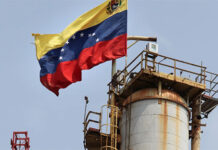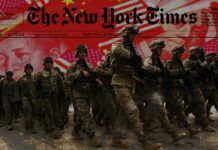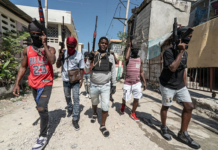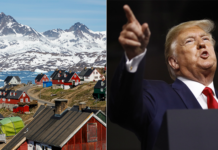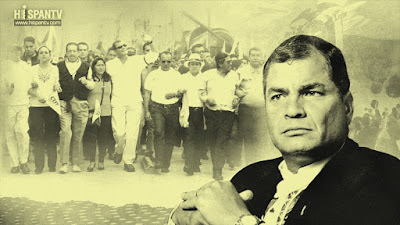
In Ecuador’s presidential runoff, it once again became clear that the main political force is “anti-Correísmo”—those who oppose former President Rafael Correa. Regardless of who the candidates are, the same side has consistently won in recent elections: the right-wing opponents of the Citizen Revolution (RC), Correa’s party. This time, the winner was current President Daniel Noboa, who received 55.63% of the votes, compared to 44.37% for Luisa González, the candidate from the leftist RC.
Since the rise of Correísmo, with Rafael Correa serving as president from January 2007 to May 2017, the left-wing bloc became the dominant political force in Ecuador. As an unintended consequence, it also helped shape the anti-Correísta right-wing space. In fact, in recent elections, a candidate from Correa’s camp has consistently won the first round but always lost the runoff. In the previous election, Luisa González herself experienced this against Andrés Arauz. Now, it has happened again.
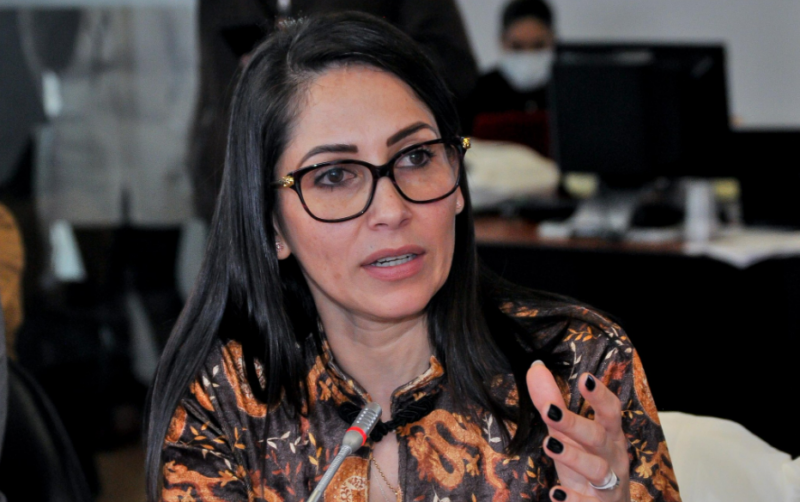
Although ‘Correísmo’ has denounced irregularities and inconsistencies in 1,800 tally sheets from the vote, which caused a delay in the official announcement of the results of the April 13 runoff, it is politically evident that Noboa has been re-elected.
Luisa González had already stated: “We do not trust the National Electoral Council. We have a CNE president—Diana Atamaint—who has shown no leadership and has failed to ensure clear rules. She is essentially Daniel Noboa’s campaign manager.” In a “restricted” and militarized democracy like Ecuador’s, it is no surprise that the electoral process was riddled with arbitrariness, irregularities and constraints. According to RC’s observations, 343 tally sheets have mismatched signatures; 171 are missing the signature of the board secretary; 780 lack both the president’s and secretary’s signatures; and 435 show numerical inconsistencies.
According to the index compiled by the influential magazine The Economist for the period 2006-2024, Ecuador is classified as a “hybrid regime.” On a scale of 1 to 10, its lowest score came last year—2024—when it received a 5.24. In other words, under the government of Daniel Noboa, amid an “internal armed conflict” and an unprecedented wave of criminal violence, Ecuador received its worst rating. This militarized regime was used by the government to create the perception that the population’s main concern—insecurity—was being addressed. Ecuador currently has the highest homicide rate in the region: 47 per 100,000 inhabitants, according to the Ecuadorian Observatory of Organized Crime.
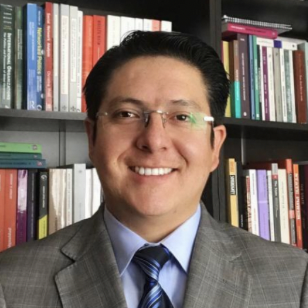
In an interview with CovertAction Magazine, Luis Córdova-Alarcón, a Ph.D. in Political Science from the University of Salamanca, stated: “Four out of ten Ecuadorians who vote believe that if a military government is effective in fighting insecurity, it does not matter whether it is civilian or military. They tend to accept U.S. intervention. As violence increases, the social psyche of Ecuadorians shifts. That is how Noboa’s fear-based campaign worked and why it achieved such electoral success.” This was reflected in a trend toward the “spectacularization” of military power, aimed at selling the idea of an effective government in the face of the security crisis.
This runoff produced entirely unexpected results—not just because all prior polls had predicted a Luisa González victory. Not only did Noboa win, but he did so with an 11-point margin. According to Córdova-Alarcón, “there was a misreading of the virtual tie in the first round (44.31% for Noboa versus 43.97% for González). The first-round results were wrongly interpreted as the solid base vote for each candidate; they didn’t reflect the flow of soft votes supporting Luisa that ultimately shifted toward Noboa.”
However, Córdova-Alarcón adds a key point: “Noboa may have won, but people overlook the fact that Ecuador is not a full democracy—it is a hybrid regime, at best, although that did not start with Noboa. There is a degradation of electoral institutions, and that process is worsening, ushering in a new cycle of ‘democratic autocratization,’ as it is called in comparative politics.”
More Noboa: The Future of Ecuador
“We have now entered a new cycle with a new strongman, Noboa, who will likely remain in power for a decade or more,” concludes Córdova-Alarcón.
For the Ecuadorian economic consultant Roberto Ruiz Blum, “the new government period of Daniel Noboa has chosen to deepen the same neoliberal economic model that has led the country to stagnation. Instead of initiating a shift toward a more equitable and productive economy, his administration reaffirms a policy based on fiscal adjustment, external debt, and weak state intervention, especially in terms of public investment.”
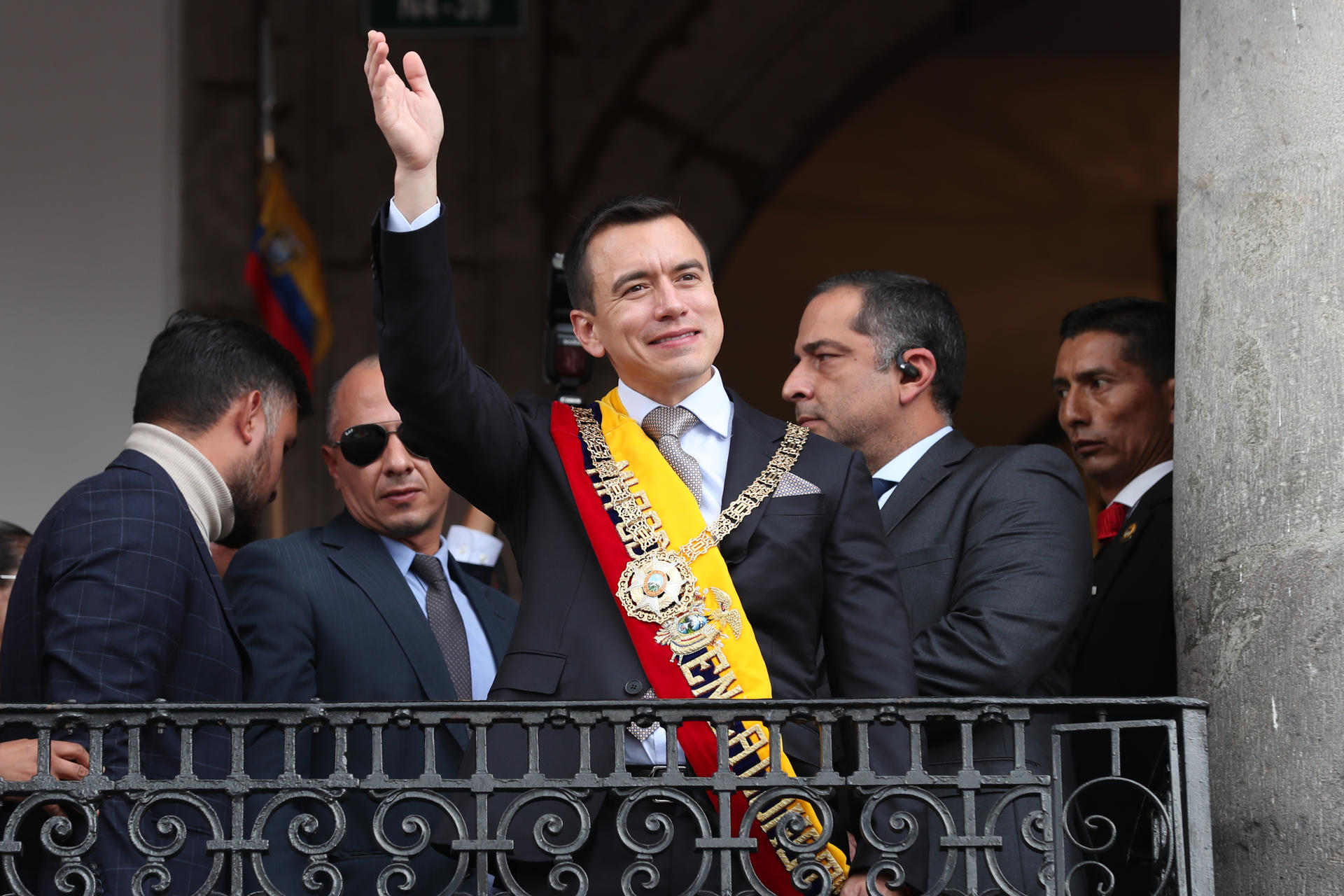
The paradigm shift began with Lenín Moreno in 2017, who had come to power with the support of Correa, only to later betray him. It was continued by Guillermo Lasso and deepened by Noboa during his first term: “For almost a decade, the virtual disappearance of central government investment has left serious consequences: low economic growth, massive unemployment, and the deterioration of essential services such as health, education, and infrastructure,” describes Ruiz Blum.
The data from last year are telling: In 2024, GDP contracted by 2%, household consumption decreased by 1.3%, public spending fell by 1.2%, and productive investment dropped by 3.8%. “Public debt has more than doubled, without generating tangible assets or sustainable improvements. The resources entered and quickly left the country, leaving a heavy financial burden on the shoulders of the citizens,” concludes Ruiz Blum.
Noboa had already authorized the deployment of the U.S. Southern Command in the strategic Galápagos Islands. Ecuador has experience in hosting U.S. military bases on its territory. In 1998, Jamil Mahuad agreed to the establishment of a base in the coastal city of Manta, where it remained until Rafael Correa refused to renew the agreement and expelled the U.S. from Ecuador. Now, under Noboa’s leadership, the U.S. reaffirms its presence on foreign soil. Naturally, the “great nation of the North” supports it.
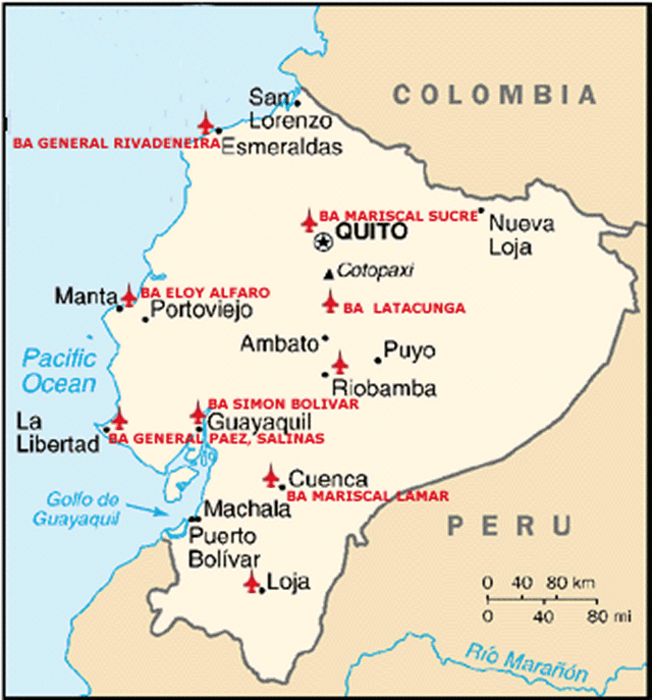
For Córdova-Alarcón, “the geopolitical importance of the Galápagos Islands has always been on the table for the U.S. During World War II, Galápagos was already the site of a military base. Now, the intention is to integrate it into the security and defense line, so that it can be subject to patrolling, troop and aircraft movements, including unmanned ones, and thus have greater control over the maritime jurisdictional space of Galápagos, which is where drug trafficking and migrant routes have been built. This led, within the framework of the U.S.-Ecuador agreements, to the Integral Security Plan, which allows U.S. troops and Department of Defense officials to directly intervene in the jurisdictional space of the Islands.” Under Noboa, U.S. interference in Ecuador, and by extension in the region, is guaranteed.
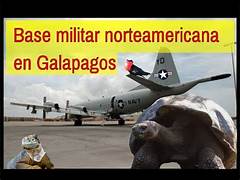
“Since Donald Trump’s first administration in 2017, there has been a shift in U.S. geostrategy and National Security Strategy: For the first time, China and Russia are recognized as the major geostrategic challenges for the U.S. Before that date, they were not considered at this level. From then on, the Pentagon designed a strategy with China as the enemy to defeat, to confront. In the last five years, several documents confirm that the use of critical infrastructure in the Latin American region, in a conflict scenario with China, could be utilized by that country as mechanisms for military confrontation. This led the U.S. to sound the alarms and attempt to regain positions on critical nodes for its geopolitical and geoeconomic interests. The U.S. perceives its real sphere of influence up to Panama. That is why the Canal is so strategic. The positioning in the Galápagos Islands is ideal to control and dominate the maritime area over the Canal and the South Pacific, where China already has important interests, including the port of Chancay in Peru,” continues Córdova-Alarcón.
The Ecuador-U.S. Association Law, which was approved by the U.S. Congress in December 2023, is the roadmap that the U.S. is following. It clearly outlines the broad framework of its actions in Ecuador. It involves intervention across the entire state. “If Noboa wants to be disciplined, he will have to follow that agenda, from agricultural policies with the peasantry to the management of data on American platforms,” concludes Córdova-Alarcón.
One of the main objectives that Noboa proposed during his campaign for this new stage is a constitutional reform. He aims to dismantle the popular rights established during Rafael Correa’s years in power. He intends to do this expediently, without calling for a constituent election, using the upcoming composition of the Legislative Assembly, in which he will have a broad majority.
He will reformulate the appointment of control authorities, eliminating the Council for Citizen Participation to return those functions to the Assembly. In short, less popular power and more for the economic elites. Córdova-Alarcón announces that this will be a government that “will dismantle collective interests. A project based on oil, extractivism and agribusiness, which will generate conflict with rural areas and environmentalists. More economic groups involved in state interests, more criminality, and protests in the streets.”

CovertAction Magazine is made possible by subscriptions, orders and donations from readers like you.
Blow the Whistle on U.S. Imperialism
Click the whistle and donate
When you donate to CovertAction Magazine, you are supporting investigative journalism. Your contributions go directly to supporting the development, production, editing, and dissemination of the Magazine.
CovertAction Magazine does not receive corporate or government sponsorship. Yet, we hold a steadfast commitment to providing compensation for writers, editorial and technical support. Your support helps facilitate this compensation as well as increase the caliber of this work.
Please make a donation by clicking on the donate logo above and enter the amount and your credit or debit card information.
CovertAction Institute, Inc. (CAI) is a 501(c)(3) non-profit organization and your gift is tax-deductible for federal income purposes. CAI’s tax-exempt ID number is 87-2461683.
We sincerely thank you for your support.
Disclaimer: The contents of this article are the sole responsibility of the author(s). CovertAction Institute, Inc. (CAI), including its Board of Directors (BD), Editorial Board (EB), Advisory Board (AB), staff, volunteers and its projects (including CovertAction Magazine) are not responsible for any inaccurate or incorrect statement in this article. This article also does not necessarily represent the views the BD, the EB, the AB, staff, volunteers, or any members of its projects.
Differing viewpoints: CAM publishes articles with differing viewpoints in an effort to nurture vibrant debate and thoughtful critical analysis. Feel free to comment on the articles in the comment section and/or send your letters to the Editors, which we will publish in the Letters column.
Copyrighted Material: This web site may contain copyrighted material the use of which has not always been specifically authorized by the copyright owner. As a not-for-profit charitable organization incorporated in the State of New York, we are making such material available in an effort to advance the understanding of humanity’s problems and hopefully to help find solutions for those problems. We believe this constitutes a ‘fair use’ of any such copyrighted material as provided for in section 107 of the US Copyright Law. You can read more about ‘fair use’ and US Copyright Law at the Legal Information Institute of Cornell Law School.
Republishing: CovertAction Magazine (CAM) grants permission to cross-post CAM articles on not-for-profit community internet sites as long as the source is acknowledged together with a hyperlink to the original CovertAction Magazine article. Also, kindly let us know at info@CovertActionMagazine.com. For publication of CAM articles in print or other forms including commercial internet sites, contact: info@CovertActionMagazine.com.
By using this site, you agree to these terms above.
About the Author
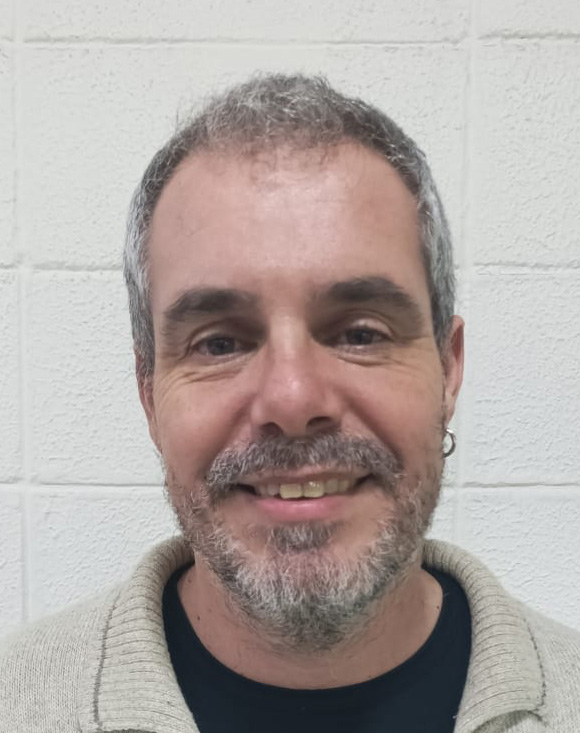
Hernán Viudes is an independent journalist and a graduate from The Faculty of Social Sciences at the University of Buenos Aires. He lives in Argentina and enjoys music, culture and football.
Hernán can be reached at hernanviudes@gmail.com.

